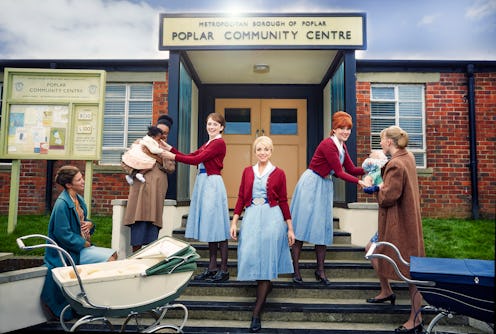Around the time The Sopranos premiered on HBO — or maybe even before then — important television became synonymous with dark, gritty tales of male antiheroes. The idea that a series following a group of midwives in the impoverished East End of London circa the late '50s and early '60s could be deemed the most important drama of the 21st century is contrary to everything you have been told about TV. But it just happened. According to The Independent, the British people voted Call the Midwife the most important drama to air so far this century, and in my opinion, they are absolutely right.
Season 6 of the feminist period piece is currently airing on PBS stateside, and yet the show still struggles to get the accolades it deserves. Maybe it's the gentle narration by Vanessa Redgrave that opens and closes each episode, or the show's cast of characters who are all either nuns, midwives, or nurses, but for whatever reason, Call the Midwife is consistently overlooked when the topic of "serious" TV comes up — and that needs to stop.
In response to the news of Call the Midwife's win, executive producer Dame Pippa Harris said,
"I'm personally thrilled that a show which takes an unflinching look at the lives of women and is created by and stars so many talented women, should have struck a chord with such a large audience."
Harris is right to be thrilled, because it truly is remarkable that a show so unapologetically female-centric has touched the lives of so many viewers.
Here's what the uninitiated needs to know about this powerful series: the cast is made up almost entirely of women, and those women range in age from their early 20s to their 80s. Each character is carefully crafted, and not a single one of them is ever marginalized due to their age. Beyond the main cast, Call the Midwife delves deep into women's issues — physical, political, and mental. While the show could do better in representing people of color on a week to week basis, it has avoided white-washing London in the way so many other period dramas have. The show is fearless when it comes to telling stories about women that are truthful, detailed, and often heartbreaking.
Call the Midwife is comforting. Returning to Nonnatus House each week does feel like dropping in on old friends. The warmth of the series in no way downplays its importance in the TV landscape though.
Over the course of six seasons, the drama has featured a storyline about the dangers of not having legal abortion available to women, it has since the very beginning prominently featured a character suffering from progressive Alzheimer's Disease, and has tackled domestic abuse, issues of faith, homophobia, alcoholism, the struggles of sex workers, and racism with care and a sharp attention to detail. When it comes to social consciousness, this period drama outdoes every other show on TV.
Having Call the Midwife receive such a high honor matters because it says people care about women and the issues that affect them. Not many shows can say they have featured an overarching arc about the various ways families react to having a child with severe birth defects, or focused on a nun's struggle to seek counseling after a brutal attack leaves her damaged in a way faith alone cannot heal. It's all too easy to dismiss Call the Midwife as a "women's show," when that is the very reason it should be celebrated.
Series creator Heidi Thomas is quietly putting a diverse group of women on TV each week and saying their voices matter. No matter their age, their religion (or lack thereof), their sexuality, their class, or their race, their struggles and triumphs are a vital part of the TV landscape. The nuns and midwives of Nonnatus House have formed bonds that are unshakable, and they stand by one another through times of happiness and heartbreak. More than that, they stand by the women in their community who need their support as they bring new lives into the world each week.
Call the Midwife isn't dark. It always finds a way to bring hope into the lives of the women it spotlights within the East End. In a time when women are still struggling for control of their reproductive rights and affordable health care, the show's hopefulness may be its most important attribute of all. Viewers need to be reminded women have been fighting for equality for a long time, and even when there are setbacks, they never give up.
There are a lot of wonderful shows with female protagonists on TV right now, and each one of them is important in their own way. However, nothing else possesses quite the breadth of storytelling or timeliness of Call the Midwife. If the 21st century has been defined by one thing, it is the rise of a new wave of feminism that seeks to be as inclusive as possible, and few other shows encapsulate the message that women and their health, friendships, and lives are worthy of being discussed and celebrated as beautifully as Call the Midwife.
